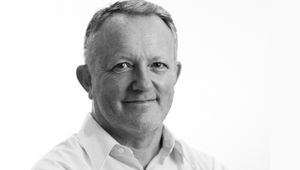
“Making Better” Was MCA’s Philosophy from the Very Start

Pat Murphy started consulting around 2005. The move was to be a stopgap on the way to “getting a big job somewhere else.” It’s now 17 years later and not only has he not stopped but he’s grown the operation that started in his home into a global business with presence in over 60 markets, employing 187 experts that can support clients across the entirety of their marketing asset investments.
“At the ripe old age of 39 I was told too old to continue in advertising, so setting up my own business meant no one could fire me," Pat reflects with a smile.
Before founding MCA, Pat gained industry experience working with the likes of Saatchi, JWT, Leo Burnett, Adstream, Procter & Gamble, plus spent time in post-production and production companies. With his background on every side of the fence he felt ideally placed to production consult, because "he’d been there and had the t-shirt."
“Frankly, unless you’ve done the job and made ads, you have absolutely no place or credibility to advise clients on how they should make theirs. It astonishes me that that some clients hire production consultants who haven’t actually done the job themselves.”
Having been on the client side he “realised that there was a misalignment in agendas between the client and agency. Clients wanted to sell more products and agencies wanted to win more awards. Neither is wrong necessarily or mutually exclusive. As proven by the Gunn Report, great ads can also drive business growth” he notes, adding, “but I felt there was a better way to bring them together through a better process, better budgeting, better relationships, better benchmarking, better future thinking, and better production strategies.”
When we ask for the raison d’etre behind officially starting the business, Pat replies instantly: “Making better.” It’s a neat encapsulation of the philosophy that drives MCA to this day, through turbulent times and rapid market changes. It’s strange then, to Pat most of all, that MCA has often found itself in a pigeonhole with the title ‘cost consultants’. “I always say to people that it’s a dead model and has been a dead model for a long time. I remember coming up against cost consultants when I was head of production and I hated dealing with them. Most of them had no idea how a budget was even put together or what the impact of their recommendations would have on the work. Sometimes I would just get asked to knock off 10% without any meaningful discussion. Ridiculous, and no value to client at all - all you got is a disgruntled agency. Our passion is for the work, it's always steeped in creativity, and we’ve been consistent with it.”

This outlook is part of the business DNA since the business is “run by someone who has production running through their veins”, and has been interested in production from as early as eight years old. “I started collecting old radio and advertising jingles when I was about 10, all of which I still have. All my old reels, DATs, and cassettes are housed in a storage unit in south-west London, now all digitised. I am a complete production anorak and cannot believe I still make money today through something I am obsessed about. My only real regret is I that am not making stuff anymore. It’s the reason I started my podcast, The Prodcast, which brings my radio, production and advertising passions together all in one,” says Pat.
What about clients who are looking for a cost consultant?
“We’d much rather work with clients that want us to add real value to the end-to-end
process. There are still procurement people who are driven purely by cost, but
my guess is that their KPI’s are different to their marketing colleagues who
ultimately hold the budget, so I believe marketing should be equally involved
in the decision on which company gets hired,” he adds. “We’re not for
everybody, chemistry has to be right, and some clients may not be quite ready
for such a holistic approach.”
A people-first hiring approach
Pat doesn’t do the job alone of course - he’s joined by a team of consultants who live and breathe the MCA values at every turn - and with that we had to ask how he goes about the hiring process. “First of all, they don't get through the door unless they have the technical expertise. It's a given. Then potential candidates get to meet numerous people in our team. Sometimes it seems quite long winded, but a collaborative hiring process often irons out any potential mistakes, and you know the saying ‘hire slowly, fire quickly’? It’s a good philosophy,” he explains.
Once a candidate has satisfied all the requirements, Pat looks out for a number of things – though the primary one is the ability to build rapport with others. It’s a practice that Pat picked up from Richard Branson. “You can have the best CV in the world but unless you have people who are good with people and all the different types of stakeholders that we have to deal with, then you're not going to get the job.” That’s not all of course. “Secondly, they have to be interesting, like what kind of things do they do outside of work? Finally, do they demonstrate the values we have. If a candidate doesn’t show values that are congruent with ours, I know immediately that it won’t work.”
“Also, a desire to keep learning is essential because we’re
in a very fast paced environment, things are changing all the time. You have to
be flexible enough to want to learn and stay ahead of the curve. Some of our
best consultants are older than me by far but they have this incredible hunger
to keep up. My learning only really started after I left school and it’s
something we put a lot of effort into in our business; it makes our team much
more rounded,” he adds.
Contemporary production challenges
MCA, and Pat in particular, has seen the production landscape evolve and have to grapple with issues - sustainability, DE&I, new production technology, digital asset management, AI. “The list is endless,” Pat summarises. Yet MCA’s position on all this complexity is simple and elegant: “We’re involved in the everyday business of managing the lifecycle of an asset.” Hidden behind this effortless encapsulation are all the aforementioned issues that make up the production ecosystem now. “When we help clients do that, it’s a massive weight off their shoulders, the knowledge that we’re part of that process and that we can recognise and fill in any gaps they have,” offers Pat.
We ask what Pat thinks is MCA’s USP and he doesn’t mince
words, saying “there’s definitely crossover between what we do and some of our
competitors, there’s no getting around that fact. However, if you look at our
senior team, they're people who are much better than me and who’ve been at the top of
their game, specifically on client side and often with expertise in the areas
our clients are having issues with. They speak the language of clients.” The
last part is key as many others claim to be able to do this, but few have the
experience to back it up.
Revolutionising Reckitt
There are a lot of success stories that we could dedicate words to; to date MCA has worked with some of the biggest names in the industry. But the one that really made the industry pause and ask, “How did they do it?”, is the partnership with Reckitt - one of the company’s most long-standing clients.
In 2022, Reckitt unveiled a trailblazing move that switched the majority of its marketing production projects to virtual production.
The seeds for the idea germinated in 2020 when Reckitt was
under a huge amount of pressure to deliver on sustainability goals and decrease
the costs of production. MCA had been the production consultants of record for 15 years and Pat knew how much more could be done for the business. He promised
to find a solution even if he didn't have it at that moment in time. Then,
inspiration struck. “I came up with the idea of putting a layer of production
people inside the client's operation and making use of the latest technology,
one of which is virtual production.”

Above: Reckitt's virtual set
Pat continues: “Many clients have producers inside, but the
difference is this team is part of MCA and, alongside the marketers, has access
to our amazing network, benchmarks, intel, and the ongoing coaching and future
insights.” The new tech-forward approach needed the human touch too - a vision
to implement the change and drive it forward. “The only person I could think of
to make this happen was Steffen Gentis, at that time the visionary chief production
officer for BBDO Germany, whom I’d known for well over 10 years,” says Pat,
highlighting once again his people-first practice to business success and the
belief that the right people have the power to make ideas happen, seeing them
over the line. “We built an incredible ecosystem inside Reckitt. I think a client
would find it very, very hard to do that by themselves. And all credit has to
go to our amazing client for believing in us and running with it.”
Tangible change
Beyond tightening budgets, sustainability and DE&I efforts continue to shape the production industry, with a growing scrutiny for companies to deliver on those commitments. Greenwashing and lip-service have never been good enough on a material level and now being seen to engage in these practices can seriously damage a reputation. MCA knows that sustainability is at the top of the agenda for all the clients it works with, and Pat is ambitious in the commitment to find production solutions that get them to net zero by 2025. “It’s our ‘BHAG’ or big, hairy, audacious goal,” as he calls it. “It can’t be just about offsetting. That’s a cop-out. This is about redesigning production to get as close to net zero as possible. It’s about being smart about how we achieve that and finding optimal solutions.”
“Businesses need to be actively involved in projects that will do good, not just pay for a membership so they can put a lovely logo on their website.”
There’s a real sense here that achieving the net zero target
isn’t only about doing what the industry requires or helping clients to deliver
on a new business goal, it’s personal and based on a world view that’s invested
in doing what’s right for future generations - not board executives. “A while
ago my son came home from a sailing lesson somewhat traumatised. He told me
that he’d seen a dead dolphin trapped in a fishing net and I had to explain to
him what’s going on in the world and about industrial trawling. It was a wake-up
moment - I want my kids, in 10 years’ time, to talk positively about what I’ve
been doing,” says Pat. Since then, MCA created a partnership with The Reef Company. “Between me and CEO, Jeroen
Van de Waal, we are planning a large number of ambitious initiatives and communicating with brands on how we can collectively help save the oceans, the planet,
and ourselves.”

Above: Pat with Jeroen Van de Waal
On DE&I, Pat references reading a recent report from the Association of National Advertisers, the outcome of which stated that “there is a gap between marketers and advertising who are showing an interest in diverse suppliers and then actually investing in it,” he notes. “Honestly? Every year we are having the same discussions. Clients tend to go with the recommendations from their agencies, and frankly those companies think using diverse suppliers means taking a risk. Plus, of course, the make up of the agency isn’t exactly diverse either. Creative partners must take responsibility for this agenda and right now I am often not seeing it in the way productions are being designed.”
How does he think it’s possible to create real lasting
change? “The industry needs to forget about the old way of doing things like
calling up a mate of a mate of a mate when hiring. That’s how it’s always been.
Instead, let’s look at the grassroots level and help people who are disabled and
from diverse ethnic and socio-economic backgrounds find their footing in the
industry through training and mentoring.” He acknowledges that it’s a slower
way of changing things but it’s also a change that’s going to be the most
long-lasting.
The way forward
One of the strengths of MCA is recognising when it’s best to lean on someone else to complement their business offering. “I am in awe and a massive advocate of Rishad Tobaccowala. He wrote a newsletter positing that the future of business is in partnerships, and I agree with him. We’re never going to be the best at everything, which is okay. We can use those partnerships to help us add capabilities to the service we already offer,” Pat explains. “We don’t need or want to do everything! But we can partner with great like-minded companies with similar values who can fill in any gaps.” Finally, MCA is making a strong move towards analytics, taking the swaths of data it collects and turning it into invaluable and actionable insights for clients which, in turn, will aid them in achieving their goals. “That’s what’s going to drive and power our growth in the future.”
Pat is also currently working on a book that’s in the last stages of being finished. “It’s not ‘how to’ book, which will be out of date after week of publication,” he clarifies. “I actually wrote it for my kids. It’s about life lessons and it will have plenty of real-life production stories and anecdotes from my 40 years in the business. If anyone else reads it and enjoys it, that’ll be a real bonus.”
In an industry that can often be deferential to claims and practices full of hot air, it’s refreshing to speak to a company founder calling problems by their real names, not downplaying their effects, and pledging to do better. Coupled with an unwavering commitment to the “making better” philosophy, it’s clear why MCA has gone from strength to strength over the years. Unafraid to move and morph with the times. It’s prepared for whatever might be in store next, leading the industry by example.














